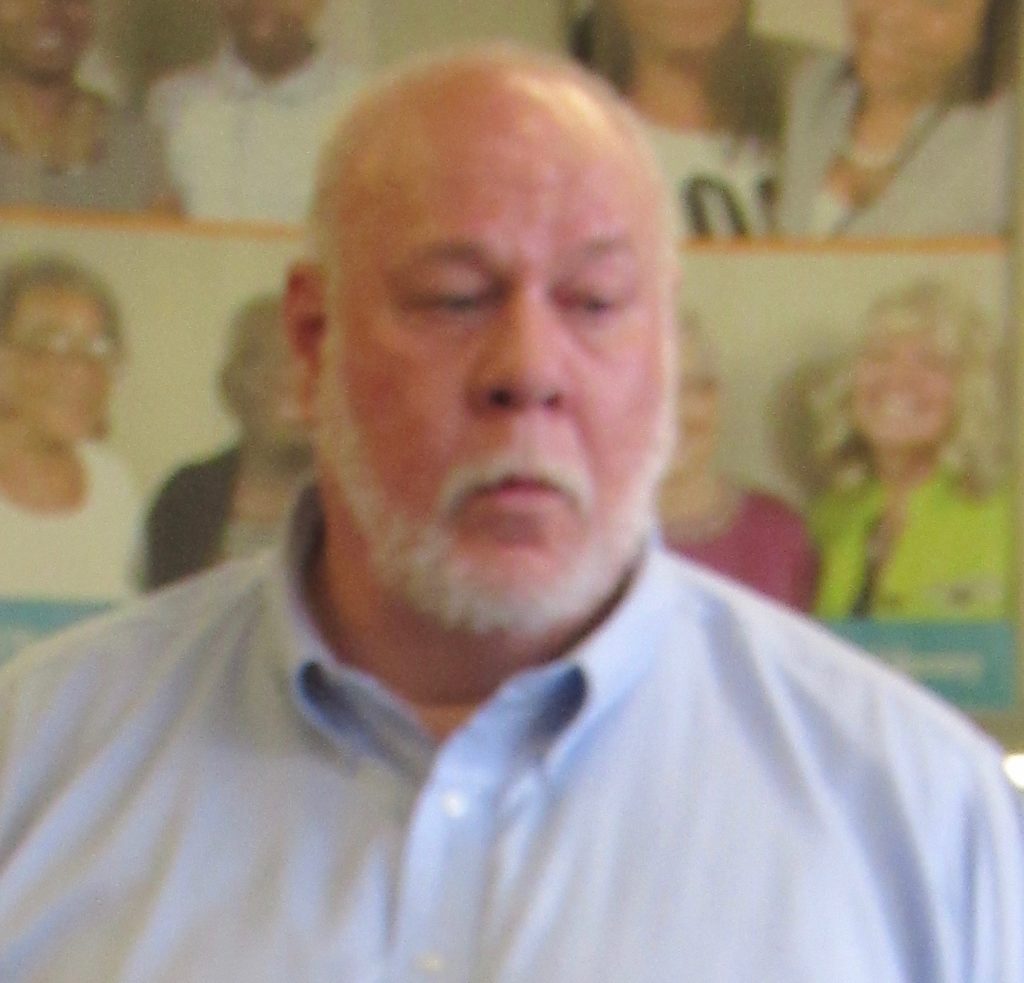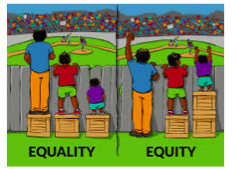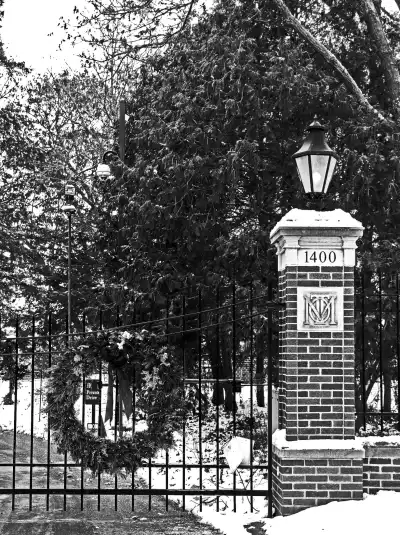By Harold C. Ford
“If your white privilege and class privilege protects you, then you have an obligation to use that privilege to take stands that work to end the injustice that grants that privilege in the first place.” — Ayelet Waldman, Israeli-American novelist and essayist
Flint resident Jeff Bean stepped forward at the Flint Public Library April 9, conceded his white privilege, and suggested ways to end it. Bean spoke before some 15 persons at the April Tendaji Talk, “The Consequences of Not Addressing White Privilege and Power.”
Named for long-time community leader Tendaji W. Ganges, the series, sponsored by the nonprofit group Neighborhoods Without Borders, offers discussions on systemic racism. The focus this season is white power and privilege, and what white people can do to end racism. Bean’s talk was the second or four sessions, with the last two scheduled for May 14 with Tracy Kim, and June 11 with Bob Brown. For the full schedule or for more information, click here.
“I grew up in Sturgis, Michigan, an incredibly white community,” Bean recalled. According to the 2010 census, the population of Sturgis was nearly 11,000, and only 1.4 percent African American.
“I missed a tremendous amount by excluding people in my world,” Bean said. “One of the things that got me into the issue of race was the realization that my world would be so much better if everybody was involved in it.”
With that newfound realization, Bean moved his family to Flint and enrolled his children in the Flint Community Schools (FCS), where he worked as an educator for 30 years. He retired from FCS three years ago and is currently employed by Ferris State University to help train teachers.
Bean came to a position of greater enlightenment on the matter of race relations with the help of friends. “I came to the understanding of race through a long academic process,” he said.
White privilege everywhere, every day:
Bean cited several examples of white privilege during his talk.
- Michigan State University’s basketball team was bounced from the NCAA tournament only four days prior to Bean’s talk. A few thousand students, many drinking alcohol, poured into the streets blocking traffic, hurling glass bottles, destroying street signs, setting fires, prompting 23 arrests. Bean heard the media describe the event as “a party (by) anxious students.” “What you saw was a riot,” said Bean. “But we don’t use that term because those were predominantly white students.”
- A Walled Lake Western High School student was randomly shot in the arm in February 2019 while dropping off clothes. The victim, a 17-year-old black male, was banned from campus by his suburban high school, including the prom, because they feared retaliation from outsiders. “I … offer to you that, had that been a white student, when he came back he would have been a hero because he survived,” Bean reasoned.
- The 2019 college admissions scandal resulted in charges leveled against some 50 persons, including 33 parents who are accused of paying more than $25 million between 2011 and 2018 to fraudulently inflate applicants’ entrance exam test scores and bribe college officials. “There is a prime example of privilege,” Bean said.
Law enforcement:
Bean referenced the gruesome shooting of black motorist Philando Castile near Minneapolis in August 2017. Castile was shot seven times by a police officer in front of a female passenger and her child when he was reaching for identification. Castile politely informed the officer he was a licensed carrier just prior to being shot.

Jeff Bean analyzing white privilege at the April Tendaji Talk (Photo by Harold C. Ford)
“We’re not asking you to be a saint,” Bean said, “but we are asking you to be sane. There’s no way to defend that.” All felony charges brought against the officer were dismissed.
Bean was further taken aback by the position of the National Rifle Association (NRA) in response to the Castile shooting. “I never heard the NRA say, ‘They’re threatening the rights of this gun owner.’”
In fact, a public statement by NRA spokesperson Dana Loesch claimed that Castile was not legally carrying his handgun at the time of his death because he was found to be in possession of marijuana. Loesch said that Castile’s “permit should’ve been out and hands not moving.”
Bean decried as “ridiculous” the “coded language” that describes such black encounters with law enforcers: “If he had just kept his hands visible. If he would’ve spoken more politely to the officer. If he hadn’t had his cell phone in his hand.”
“Those phrases are what comes out of a position of privilege,” Bean asserted.
A black female friend once advised Bean about the street-level difference between her black son, Greg, and his white son, Malcolm: “If Greg gets pulled over by the police, he’s worried about getting out of it alive. If Malcolm gets pulled over by the police, he’s worried about you [Bean] taking away the car.”
“And that’s the difference between privilege and not privilege,” said Bean. “Neither one of them [the sons] asked for that. Neither one of them did anything to deserve or not deserve that.”
Equality and equity:
“There’s often the mistake that we believe that everybody is at the same level and we’re not,” said Bean. “Everybody’s coming to the table with a whole history of issues and events.”

Graphic courtesy of Jeff Bean
“There’s a difference between equal and equity,” reasoned Bean. He cited the commonly used illustration of this that involves three youngsters trying to watch a ball game over a fence, one tallest, one shorter, and one shortest. The same size box will not equally accommodate all three youngsters’ ability to see the game.
Bean would illustrate this concept with former students by putting them at one end of the hallway and a wastebasket at the other. Each would wad up a sheet of paper; the object was to throw the wadded paper into the basket. But first he would ask loaded questions such as: “Who has a parent that went to college? Who has traveled to a foreign country? Who is from a family with two parents?” Affirmative answers allowed the students a step closer to the basket as a way of demonstrating privilege.
“Fish don’t know what water looks like,” said Bean. “If you take them out of water, then they realize the value of water. White people are the same way (with privilege).”
Trump:
Multiple references to the current U.S. president was common during the 90-minute event. “There are people out there who will take advantage of it (privilege),” said Bean. “We actually elected one to president.”
“The president’s base isn’t going to change,” Bean predicted. “For them to admit that they have been that wrong is absolutely terrifying. … Their whole life has been built on this idea that they deserve that privilege.”
“At some point, Donald Trump will go away, but when he goes away that base is still there,” said Bean. “I truly believe that what we’re seeing are the death throes of the white supremacist movement. That’s why it’s so loud, because they’re on their way out.”
Solutions:
Reparations: Local attorney John Streby contended that “talk about reparations … is going to insure Trump’s reelection … I don’t think it has enough popular support to ever take effect.” Bean agreed that, “If you want to terrify white people, use the term reparations (but) the conversation needs to happen.” [1]
Elementary education:“They (elementary teachers) are the true revolutionaries of the world,” claimed Bean. “If we don’t get elementary teachers who will shift peoples’ perspective on matters of race and gender, then we’re not going to change the population.”
Law enforcement discipline and training:“There has to be very harsh penalties (for police misconduct),” Bean said. “Make sure we have a legal system that enforces what we say we want.” He also advocated for effective training. “You can’t just go in and say, ‘We’re going to have a weekend training and it’s good.’”
Social media and youth: Bean claimed youth are having a more diverse racial experience in America than older generations due, in part, to social media that has the ability to cross physical barriers. “Where a lot of that is happening is through the social media,” he said. “A lot of kids are online and worldwide.”
Increased opportunities:“Your life is better if everybody has a better chance,” Bean said. “How many great minds were beat down and never got a chance? It doesn’t just affect that person; it affected me. I didn’t benefit from their achievements.”
Shared social experiences:“If you break bread with somebody, your whole perspective changes,” said Bean. “If you sit down and have a meal with somebody who’s different, then your life will alter forever.”
EVM Staff Writer Harold C. Ford can be reached at hcford1185@gmail.com.








You must be logged in to post a comment.